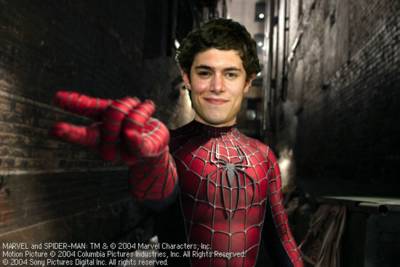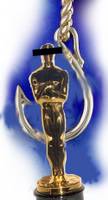My one word review of
Fahrenheit 9/11: “Powerful.”
That one word carries with it both positive and negative connotations, and it is in both senses of the word that I use it to describe how I felt about the film.
Beyond that one word, I have a lot of miscellaneous thoughts, so if you’ll allow me to make like Michael Moore and lay them all out in no coherent order and towards no particular thesis:
For some background on how I felt about Mr. Moore going into this latest piece, skim
my post on Super-Size Me and the state of documentary filmmaking.
Overall, I had a mixed reaction to
Fahrenheit (I might be in the minority there since it seems most people love it or hate it). I think my opinion was muddled because the documentary itself was an uneven piece of work. There were sequences and moments that I thought were extremely well put together, but then there were too many stretches that I considered sub-par quality for Moore. His films are usually compelling and/or entertaining throughout, so probably the most shocking thing for me about
Fahrenheit was that at times it’s rather tedious and redundant (Did we need five minutes at that trade convention to get the point that capitalists were profiting on the war? Did we need the stories about both the cookie-eating peaceniks and the elderly gym rat to know that Patriot Act was leading to investigations of harmless people?). I equate Moore, to some extent, with
former humorists like Janeanne Garofallo, Al Franken and Dennis Miller – they’ve become so serious about their politics that they often forget to be funny (there are definitely moments of great satiric humor in
Fahrenheit, but not nearly as much as in Moore’s other movies).
Another problem that kept me from getting involved as much as Moore or I would’ve liked is that I went in skeptical of all the filmmaker’s “facts,” especially after all
the misrepresentations of truth in Bowling for Columbine.
Roger Ebert expressed his feelings about that deception nicely:
The pitfall for Moore is not subjectivity, but accuracy. We expect him to hold an opinion and argue it, but we also require his facts to be correct. I was an admirer of his previous doc, the Oscar-winning "Bowling for Columbine," until I discovered that some of his "facts" were wrong, false or fudged….
Because I agree with Moore's politics, his inaccuracies pained me, and I wrote about them in my Answer Man column. Moore wrote me that he didn't expect such attacks "from you, of all people." But I cannot ignore flaws simply because I agree with the filmmaker. In hurting his cause, he wounds mine.
Even if everything that’s in the film is technically factual, Moore is most often guilty of the sin of omission, particularly omission of context. Many of the interviews are presented without identifying the subject (or even the interviewer when it’s obviously not Moore) or providing dates and locations. Likewise, most of the archival footage of Bush is edited in without giving us any sense of when or where or even how it was captured. I feel like this would help to ease concerns that Moore manipulates the truth and I doubt any of that contextual information would make the president look any less like a buffoon.
David Poland, in his
review, noted in one instance how the clarification of fact might have made it slightly less salacious, but would’ve still conveyed the point that Moore intended:
The idea that the rich and powerful should be willing to send their children to war is not new, but it is compelling. But why does Moore have to goose the game? If you are going to ambush Congressmen (and he never finds a female member of Congress to harass) on the street to ask them to enlist their kids, wouldn't it be nice to know how many members of Congress have children on traditional enlistment age, say 18-25? If that number is only, say, 100, and they have a total of 150 eligible sons and daughters, I guess that is less interesting than 535 members having only one child fighting in Iraq. But it shouldn't be. Every great story starts with a willingness by the storyteller to be supremely honest.
Also, for those of us who haven’t followed every detail of every presidency, it would be informative if Moore had included comparisons to previous administrations when listing facts. For instance, while the statistic about how much time Bush spent on vacation during the first eight months sounds staggering, I have no idea how that stacks up to the amount of time Clinton or Bush Sr. or Reagan or Carter spent relaxing.
No context.
Still, even if there is a story on the cutting room floor that puts all of the idiotic things Bush says into context, the video tape does prove that he did say those idiotic things. And I don’t doubt that there’s some veracity to most every accusation Moore levels. Even if only 25% is true, that’s a lot of very unsettling, revelatory information. I just wish I could trust that all of the unsettling and revelatory information I was seeing and hearing for the first time were irrefutably accurate.
Another segment that I believe suffers from lies of omission is the montage one of my friends aptly dubbed “Springtime for Baghdad.” At first I was surprised by the beatific images of Iraqi citizens shopping and dining in outdoor cafes and children playing on the playground under Saddam’s apparently light-hearted regime. Had I been duped by the right-wing media’s suggestion that Iraq was an oppressive place to live? Then I realized that you could’ve made a similar bit of film celebrating life in Germany circa 1939. In fact, somebody did. It was called
Triumph of the Will. Hell, the Nazis even found a way to make Concentration Camps look like summer camp (at least according to the trailers for the documentary
Prisoner of Paradise, which I have yet to see). So why didn’t Moore even hint at the torture dissidents faced under Saddam? Is he so insecure in his film’s message(s) that he can’t even acknowledge that Saddam is no saint, independent of whether or not it was right for our country to take military action? Would it have undercut the horrors that the cookie-eating peaceniks suffered at the hands of Herr Bush’s Patriot Act?
One more segment that made me feel a little icky (and from talking to friends, I’m not the only one who picked up on this even if I haven’t read any criticism of it yet) was the “Shiny Happy People Holding Hands” photo montage of Bushes shaking hands with, to use the slur it conjured in my head, a barrage of “towelheads.” Moore didn’t identify by name most of the Arab men pictured, and while it’s implied they are all Saudis, I don’t remember if that was explicitly stated. The point is, I found something disconcertingly racist and xenophobic about condemning a president and former president for having diplomatic relations with foreigners (especially desert-dwelling foreigners). If this were a right-wing doc that included a similar sequence, replacing the Bushes with Clinton (and I’m sure there must be plenty of footage of him being friendly with foreigners), that would be the first thing the liberals would attack.
Again, there was a lot that I liked about the movie. I was worried that his coverage of September 11 would be overly exploitative and I really didn’t want to watch the planes flying into the towers on the big screen. So I was quite impressed with and moved by Moore’s treatment of the horrors of that day. He managed to rekindle the emotions that we all carry with us into the theater without showing any fire or bodies. And the final shot of the debris twirling in the wind is one of the more haunting images I’ve seen.
There were several other moments that earned legitimate tears from my eyes, and not in a way that made me feel manipulated. He just found some people with some very sad stories.
Probably the best thing about the movie is the way in which it’s stimulating discussion and debate (and hopefully voter turnout – though the skeptic in me is dubious that even half of the people who are lapping this movie up will
vote in November). That, and the way it shed light on some things most of us weren’t aware of. And for those things, I begrudgingly owe some gratitude to Michael Moore. I say begrudgingly because of one of my biggest problem with the film:
Since the 2003 Academy Awards, Michael Moore’s ego has been swelling faster than Veruca Salt. He’s always been a bit self-righteous and self-aggrandizing, but since his infamous acceptance speech, he’s ascribed himself the role of demagogue. It’s apparent any time you see him on TV, but I was hoping it wouldn’t find its way into
Fahrenheit. While it wasn’t an overwhelming presence, there were at least two glaring instances where it reared his big fat head:
First, when he showed the footage of himself demanding that the White House release George W. Bush’s National Guard records. In the voiceover, he then says something to the effect of “Because of me and my demands, the White House released his records.” Now, I remember when this was going on (it wasn’t that long ago), and as I recall, there were several million other people calling for the release of that information. For Moore to assume credit for that action demonstrates a delusional arrogance on par with that of George W. Bush. Lord help us when Bush is defeated in November and Moore takes all the credit for ousting him with this movie.
The other instance comes at the very end. As the last images fade, he cuts to a credit for himself: “Written, Directed and Produced by Michael Moore” (I think that’s what it says). Only then does it cut to the dedication card, where he graciously dedicates this movie to all those poor people who’ve senselessly died. And then we get the credits for all the people, less important than Michael Moore, who put together the film. Now, correct me if I’m wrong, but doesn’t a dedication screen like that usually come before the credits start rolling? Or else they come at the end. But I don’t think I’ve ever seen one positioned like that. Maybe it’s a little thing I’m reading too much into, but to me, it says that Michael Moore getting some more credit is just a little higher on his list of priorities than honoring the thousands of people who died to make his film possible. Coming at the end, it left a bad taste in my mouth. Especially because it meant that the rabid crowd was left hooting and hollering over the solemn dedication.
In conclusion, I think it’s definitely an important film. I was about to say that it’s one everyone should see, no matter what their political affiliation. Unfortunately, it might be so off-putting to some that they’ll completely reject the parts that they really should be made aware of. I don’t think it should win the Academy Award for documentary (and not just because I don’t want Moore’s head to crush his body). Although it admirably tackles a topic so timely and grandiose, it’s not as well made or consistent as two docs I happened to see last week (that hopefully I’ll write more about soon):
Born into Brothels and
Metallica: Some Kind of Monster.
By the way, I knew the movie would be a blockbuster on the coasts and in the big cities, and I knew it would play well to the choir, but
here’s an interesting article from The Los Angeles Times about how it fared elsewhere and with others.










